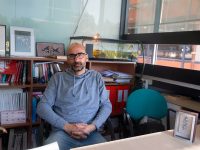
 Blade Runner Blade RunnerA scene from Blade Runner, an interesting glance at a not-so-distant future. |
||||||||||||||
In 1964, science fiction writer Isaac Asimov (1920-1992) published, on the occasion of the New York World Fair, an interesting text with predictions for the world fifty years later, that is, 2014. Surprisingly, many of Asimov’s predictions proved correct over the years, some of them with astonishing accuracy. The writer used a winning formula: solid scientific knowledge and a lavish imagination. Inspired by his success, we asked the President of the Institute for Catalan Studies, Joandomènec Ros, and other figures of science, for a similar exercise to forecast the future of 2064, fifty years from now. |
||||||||||||||
|
The probability of getting something wrong when making a prediction is high… even more so when we are predicting the future! Not only bookmakers and astrologers make mistakes; also scientists, who are supposed to make predictions with sounder bases, often fail. At the risk of failing, however, I will venture and make some predictions. There are two different approaches to foresight: 1) looking at the rear-view mirror, believe the tendencies and extrapolate: if the world population increased this way in the last decades, if oil reserves are depleting at this rate, if the number of dead from starvation (or war, or disease, etc.) grow in such a way, if life expectancy grows enormously, in the future we can expect more of the same thing; 2) resorting to a deus ex machina, that is, appeal to random, contingent aspects we did not count on: just as personal computers, mobile phones, the Internet, etc. have opened areas of communication, calculus, information, education, research, etc. we could not imagine before, who knows if the invention of a new device, the discovery of an element (molecule, mineral, etc.) or an unknown energy source will open a new, previously inconceivable, world. |
«The population increase will not go hand in hand with an increase of the resources needed to support them, which means more hunger, wars over basic resources, epidemics and migrations» |
|||||||||||||
|
Clearly we cannot predict the aspects of the second section, but we still have the first one. Primary predictions are easy here (actually, they have already been done): the world’s population will increase in these many millions, not more (?); China with overtake the United States as world power; global temperature will go up so many degrees, and the sea with it, desertification, ocean acidification, etc.; this or that scarce mineral will become extremely expensive, etc. Secondary predictions (a consequence of the first ones) are a little more risky: the population increase will not go hand in hand with an increase of the resources (of every kind) needed to support them, not even with genetically modified crops or cultivating more natural areas, which means more hunger, wars over basic resources (such as water), epidemics, economic or war migrations, etc.; today’s industrial centres will be tomorrow’s industrial colonies: inspired in Detroit; the best wines will be Swedish, Canadian and Greenlandic; the ski resorts in the Pyrenees and the Alps will move to the Himalaya and Antarctica, etc. Tertiary predictions, a result of the secondary ones, are even blurrier: what countries, regions and cities will grow and which ones will sink as a consequence of the new situations. Will the Suez Canal and the Mediterranean (and Barcelona, Tarragona and Valencia) lose their maritime traffic from Asia to Europe – as it will be faster and cheaper to cross the Artic with no ice? Will today’s tourist coastal areas yield before the shores of countries that are too cold now, or politically unstable, but will eventually get hotter and stabilize? Will political and economic systems other than capitalism, which have failed or are going to, depend more and more of military and religious dictatorships, of corporations, of a financial system detached from real economy? What will be the space for real democracy in a world that corrupts it every day? Who knows! |
«What will be the space for real democracy in a world that corrupts it every day?» |
|||||||||||||
|
However, some predictions are easier, now that we have enough evidence (don’t forget eventualities, though). Progress in the field of medicine may increase life expectancy (for the few powerful ones, of course); project Gilgamesh goes even further: it will produce practically immortal people. Interplanetary travel will not be, however, as easy as they told us: radiation, weightlessness and lack of exercise will leave the bodies of astronauts injured and exhausted, unable to recover. Good-bye forever Mars, Venus, Europa, Titan…! The Schengen Area will disappear, pestered by hundreds of thousands and millions of refugees of all kinds that will reach European shores from the south, east and everywhere, and will force European governments to «close» the continent, just as the United States closed their borders. It should be reminded that the result of some processes of slow accumulation is a quick, destructive (and unpredictable) burst; in the same way as a forest that reaches maturity after centuries of development only to burn in a few hours, a slow but uniform increase (of greenhouse effect gases in the atmosphere, of the number of impoverished people, disinherited by economic inequality, of the demise of the biggest fishing companies in the world, etc.) can end up with a climate, social or biodiversity explosion. We can always hope there will be a happenstance, unexpected event that will solve these and every other problem (or almost every one) in a serendipitous way that no one foretold. A scientist should not believe in miracles, but the fact that our species still survives in 2014, after many extinction events, genetic bottlenecks, wars and global epidemics, is one of the biggest and more inexplicable (and unpredictable) miracles to ever happen in this world. Joandomènec Ros. Professor at the Department of Ecology of the University of Barcelona and president of the Institute for Catalan Studies. |
«Interplanetary travel will not be, however, as easy as they told us: radiation, weightlessness and lack of exercise will leave the bodies of astronauts injured and exhausted» |
|||||||||||||
|
||||||||||||||
| © Mètode 2014. | ||||||||||||||





